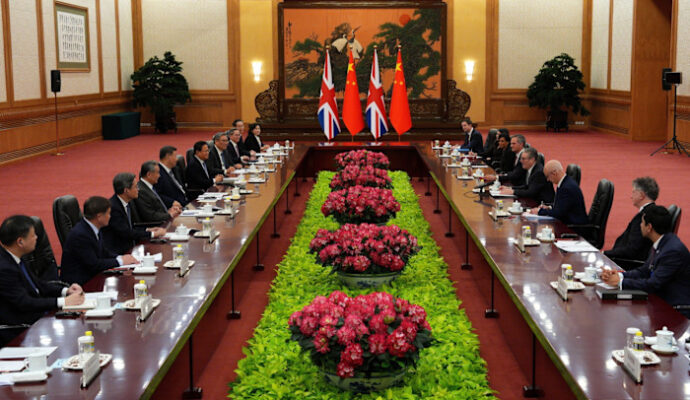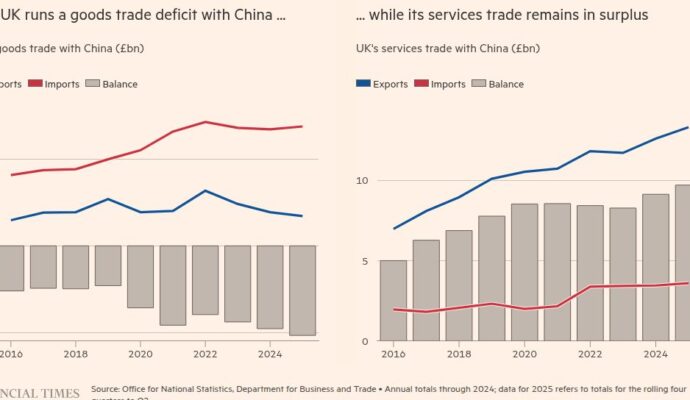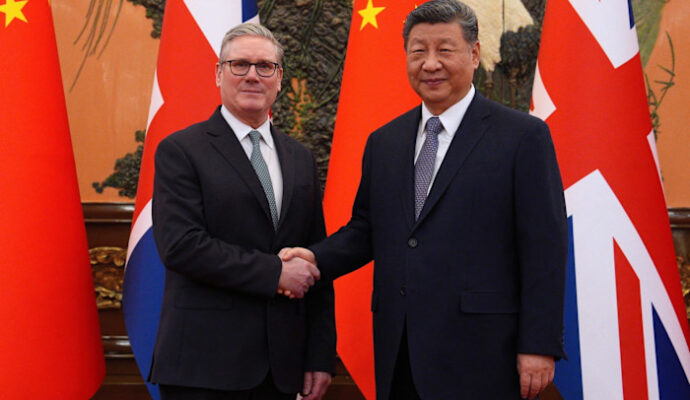Receive free Hong Kong politics updates
We’ll send you a myFT Daily Digest email rounding up the latest Hong Kong politics news every morning.
“Rats” is how Hong Kong leader John Lee has taken to referring to a group of eight pro-democracy activists with a combined bounty of $1mn on their heads.
The activists, self-exiled in the UK, US and Australia, were this month made the subject of the reward for alleged national security offences including secession and foreign collusion as Lee’s government cracks down on dissent. Since then Hong Kong authorities have gone further in showing their determination to suppress any sign of support for the eight, with Lee’s rhetoric reinforcing the message.
“We should treat those wanted by police, especially the eight who violated the national security law, as street rats that should be avoided,” he said during a trip to south-west China to boost opportunities this month, before repeating the term in a press conference in Hong Kong. Authorities would “exhaust all means” to pursue the eight, who should surrender or “live in fear” forever, he said.
The parents and brother of Nathan Law, one of the activists, were held for questioning last week as his family home was raided, although Law, who is in the UK, said in 2020 that he had cut his ties to his family. Police also arrested five former members of Law’s pro-democracy political party for allegedly running an app to boost so-called yellow businesses that were sympathetic to pro-democracy protests that erupted in Hong Kong in 2019. The apparent aim is to cut any financial ties to the exiled eight.
Meanwhile Lee is also the jovial face of a “Hello Hong Kong” government campaign drawing international visitors. “A world city like no other extends the warmest welcome to you,” he says in a promotional video. The Chinese territory is also attempting to reboot its Covid-hit Asian premier financial hub status and woo foreign investments.

But analysts said Lee’s priority — with the backing of Beijing — was to stamp out the influence of political activists and reinforce China’s tough line on national security, even if it damaged the city’s international reputation.
“That’s what authorities are doing. National security is number one,” said John P Burns, an honorary professor of politics and public administration at the University of Hong Kong. “It demonstrates seriousness [on national security] . . . to foreign governments, Hongkongers overseas and people in Hong Kong.”
Officials say Hong Kong is bouncing back. The city was “moving full steam ahead”, justice minister Paul Lam told lawyers and business representatives on July 11. “Hong Kong is resilient and remains a leading international financial centre and an ideal place for doing business.”
But a foreign business chamber representative said Hong Kong “is sending out so many mixed signals” as the hard line pursued by Lee — a former career policeman handpicked by Beijing as Hong Kong’s chief executive last year — hinders attempts to restore confidence.
“It certainly isn’t helping the efforts to reshape the narrative,” the chamber representative said. “It’s not a matter of only ‘Hello Hong Kong’ and then everything is going to be great again.”
Unease in the business sector has been fuelled by events such as a looming Hong Kong government court injunction against US tech giants including Google and Meta, which could compel them to remove a popular protest anthem from their platforms. A hearing is due this month.
“It seems that the national security and political correctness priority trumps economic priority,” said Ho-fung Hung, a professor of political economy at Johns Hopkins University in the US. “We will see a tug of war between these two priorities.”
Lau Siu-kai, a Beijing adviser and a consultant to the Chinese Association of Hong Kong and Macau Studies, described Hong Kong authorities’ move as a “pre-emptive” action against western interference, with support to exiled activists being cut.
Lau said “Hong Kong’s commercial ties with the west are seeing limited impacts”, making a distinction between the views of investors and businesses and the different agenda of western governments. Beijing has hit back at the outcry from the US, UK, Australia and Canada over the “extraterritorial reach” of the city’s security law.

Asked about the raid and bounties, a Hong Kong security bureau spokesperson told the Financial Times that the government would “fight against” national security violators “in full force”, utilising all necessary measures.
Lee’s hardline echoing of some Beijing diplomatic positions was also illustrated by the city’s decision this month to ban Japanese seafood imports from 10 prefectures if Tokyo goes ahead with plans to release treated radioactive water from Fukushima. The release has been approved by the UN nuclear watchdog.
Hong Kong’s pandemic-battered economy is still in need of a boost after the exodus of more than 140,000 residents. The total investment volume of non-residential investment deals exceeding HK$100mn ($13mn) dipped 45 per cent year on year during the first six months of 2023, according to real estate agency Cushman & Wakefield, with prime office vacancies at record high levels.
A quarter of businesses surveyed by the American Chamber of Commerce in Hong Kong said this year they expected to reduce investments in the territory, while 40 per cent described “overseas public perceptions of Hong Kong” as a top challenge.
Some financiers are, however, still bullish, citing Hong Kong’s proximity to mainland China and more business opportunities to come — a narrative often hailed by local officials.
“I just think this mindset, people saying you are going to exit, you are not coming back. You cannot afford to,” one senior banker at a foreign bank said. “They are missing the whole big picture.”


